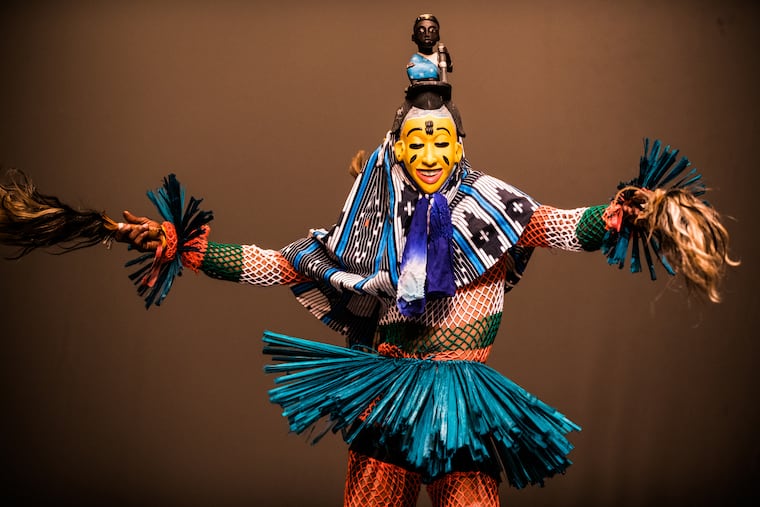Kulu Mele celebrates 50 years bringing African culture to Philadelphia
Philadelphia-based African dance and drum ensemble Kulu Mele bring the story to life with the world premiere of 'Ogun & The People.'

Among the stories the Yoruba tell is the tale of Ogun. After an arduous journey, the powerful warrior — who’s an Orisha, or deity — returns home. But he’s so disheveled that his people fail to recognize him. So he retreats into the forest and takes the people’s tools with him, leaving them without weapons to protect themselves or implements with which to farm the land. Desperate, the people turn to several other Orishas for help. Finally, Oshun, goddess of love and sexuality, manages to coax Ogun out, restoring balance to society.
This weekend, Philadelphia-based African dance and drum ensemble Kulu Mele brings the story to life with the world premiere of Ogun & The People. The group is celebrating its 50th anniversary, and giving the parable a vibrant multimedia retelling that draws from Afro-Cuban music and dance.
Artistic director Dorothy Wilkie saw the relevance of Ogun’s story for a modern audience, especially at a time when violence and crisis often dominate the headlines in Philadelphia and across the country. Ogun is associated with war, she explained, but he also provides the tools to move beyond conflict and build civilization.
“The community had to come together to figure out what to do so they could have peace again,” said Wilkie, who’s known as “Mama Dottie” to her adoring company. “I think that’s what we need to do now.”
It’s a family
Upstairs at West Philly’s Community Education Center, the rehearsal room was full of a sense of family and community as Wilkie led the ensemble through the piece. Beside Wilkie stood her husband, music director John Wilkie. They chanted together alongside a trio of batá drummers. As Oshun, dancer Crystal Gatling whirled in a honey-gold skirt; as Ogun, Edward Smallwood acrobatically spun a prop machete.
Surrounding them: a ring of dancers, who laughed and chatted when offstage; nearby, young children from the company’s Omo Kulu Mele classes watched and played. For more than a year, there has been an intense focus on the development process and performance, but the mood in the room was convivial and warm.
“That’s what Kulu Mele is,” Mama Dottie said simply. “It’s a family.”
The Wilkies became part of that family early in its history. They both joined in 1971, two years after the troupe was founded by Baba Robert Crowder, a jazz percussionist who had played with the likes of John Coltrane and studied African, Haitian, and Brazilian drum traditions.
The company didn’t just bring African dance traditions to Philadelphia audiences, it also played a crucial role in the African American life of the city.
“It wasn't always favorable to associate with Africa,” says Ira Bond, one of the company’s lead drummers, who has been with the company for more than two decades. “In the landscape of Philadelphia, Kulu Mele has been a cultural custodian for new generations.
“It feels good to be able to dispel myths and to help people think about the complexities of other cultures,” he said.
“We played a lot of rallies,” recalled John Wilkie, raising his fist in the familiar Black Power gesture while recalling the group’s early days. “We were involved in a lot of revolutionary stuff. It wasn’t about money then; it was about learning. It was a spiritual thing with us.”
That spirituality is apparent in the Wilkies’ devotion to the group over the last five decades. Before the couple owned a car, Mama Dottie would take three buses to get to rehearsals three times a week. All five of their children have been involved in the company. And, in 1982, Mama Dottie took over the helm as artistic director. (Crowder died in 2012, though Mama Dottie keeps his spirit alive. “I know he’s smiling at where we are now,” she said.)
From Cuba to Philly
Last September, the members of Kulu Mele traveled from Philly to Cuba, where Yoruba traditions and folklore moved with slaves from West Africa, forming the basis of the island’s Santería religion.
In Santiago de Cuba, they studied with the Cuban dance company Ballet Folklórico Cutumba, and got to experience, firsthand, the culture behind Ogun & The People.
“It was a very powerful experience,” Bond said. At the Cimarron Memorial, they paid tribute to formerly enslaved people who had escaped into the mountains. “The place was amazingly peaceful and felt connected to a spirituality that helped put the dance into a context that it wouldn't have if you just learned it in Philadelphia.”
As Ogun & The People finally comes to the Annenberg Center stage this weekend, Mama Dottie is finally carving out a bit of time to think back on not just that journey but the entire five-decade history of Kulu Mele.
“I don't know how we got here, but it’s been a wonderful trip,” she said in her typically understated manner. “I feel proud at where we are today and at how rich our culture is.”
8 p.m. Saturday & 3 p.m. Sunday, Annenberg Center for the Performing Arts, 3680 Walnut St., $29-$49, 215-898-3900, annenbergcenter.org